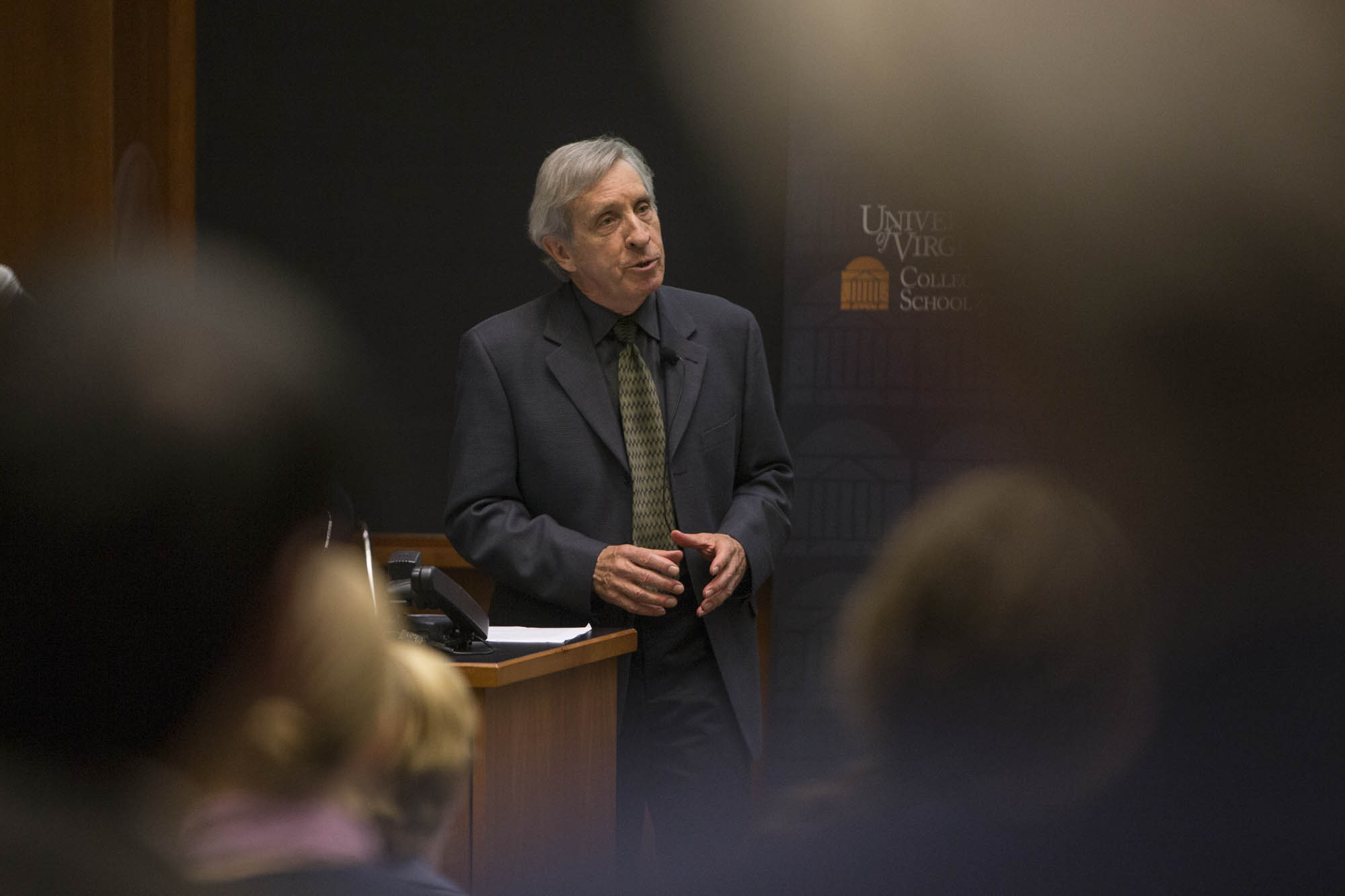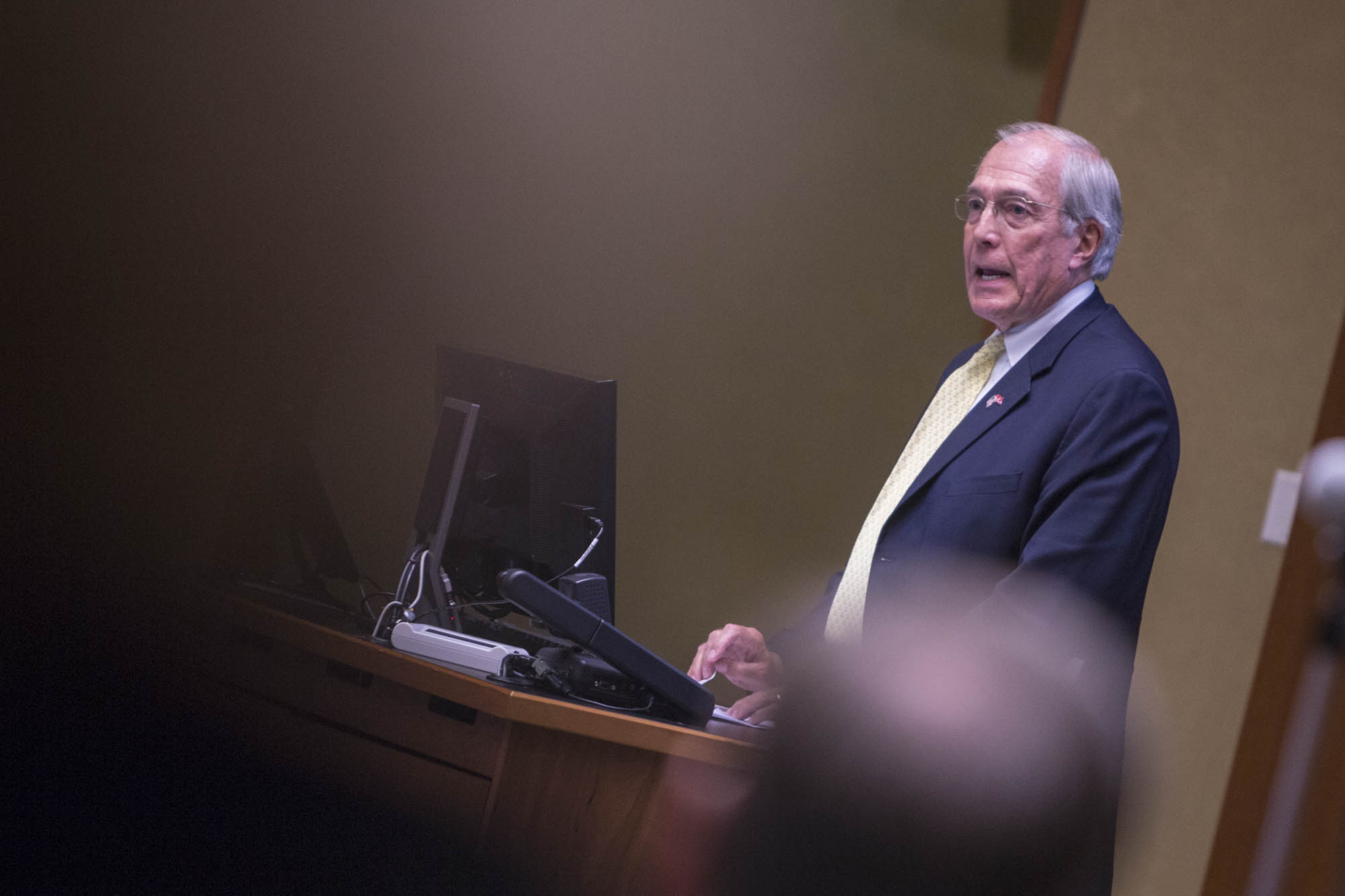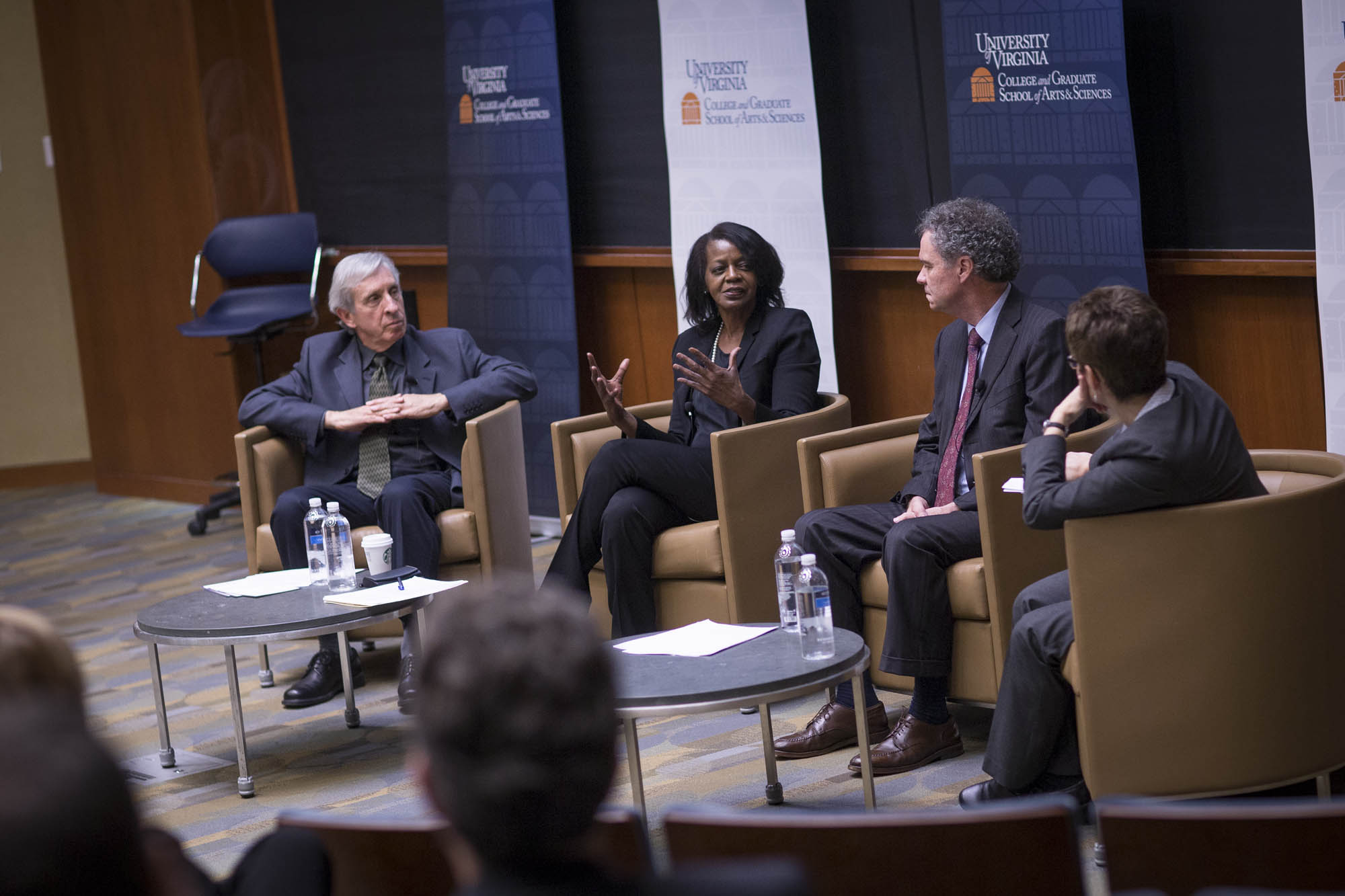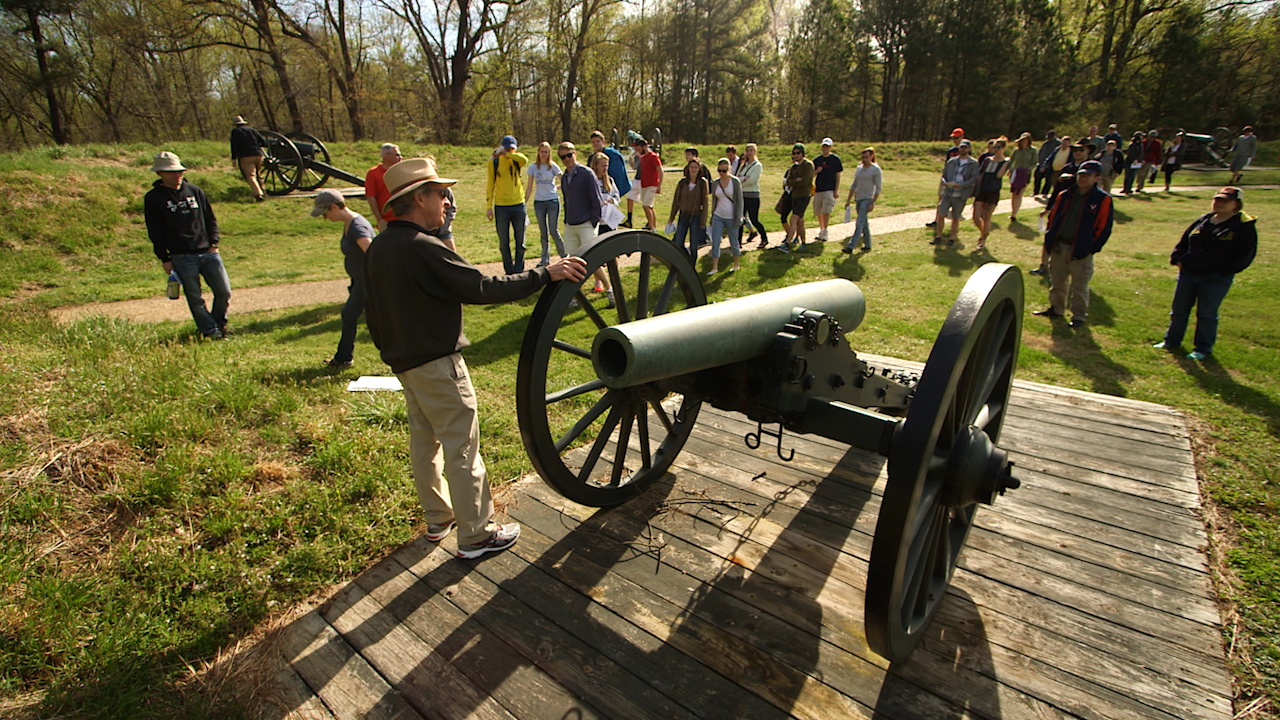Editor's note: This story was originally publshed Oct. 19, 2015.
In the pantheon of American events that charted the course of the nation, almost nothing comes close to the Civil War.
Maybe nothing at all.
The war was all things at once: Horrific. Historic. Gripping. Confounding. Liberating. Endlessly fascinating. Supercharged with characters and complexities, it would reverberate for decades and across generations.
Already a leader in Civil War studies, the University of Virginia is launching a new center that will deepen its engagement in this broadening field and will expand research opportunities for students, faculty and other scholars. The opening of the new John L. Nau III Center for Civil War History was celebrated Friday with a public opening ceremony on the South Lawn.

Professor Gary Gallagher spoke Friday at the dedication of the John L. Naul III Center for Civil War History. Photos by Sanjay Suchak / University Communications.
“The Civil War was such a gigantic event,” said Gary W. Gallagher, the John L. Nau III Professor in the History of the American Civil War and director of the new center. “It was the single biggest military event in U.S. history, and it touched everything. It dealt with the relationship of the central power and the states, it ended slavery and created what followed, and there was a question as to whether the work of the founding fathers would survive. There are many issues that still resonate.”
The Board of Visitors in June approved the center, which was funded by current and future gifts totaling $13 million gift from John and Bobbie Nau and the Nau Foundation. A 1968 history graduate, a founder of the College Foundation and a former member of UVA’s Board of Visitors, John Nau also contributed $11 million toward the construction of Nau Hall, which houses the Corcoran Department of History on the South Lawn.
“The ultimate goal is to help make UVA the top academic institution for the study of mid-19th-century American history, particularly the Civil War,” Nau said. “It’s also about the students. Let’s teach what really went on in that period. That’s exciting.”
Former Board of Visitors member and 1968 UVA history graduate John L. Nau III spoke Friday at the center's dedication.
The center will focus on the years leading up to, during and following the Civil War and will aim to serve as a focal point for disparate areas of scholarship that spring from a common origin. As the nation continues to grapple with symbols and storylines that trace back to the Civil War and 19th-century America, Gallagher said, the reverberations continue.

Former Board of Visitors member and 1968 UVA history graduate John L. Nau III spoke Friday at the center's dedication.
“You need an understanding of the Civil War to understand United States history,” Gallagher said. “You can’t understand the present without understanding the Civil War.”
Elizabeth R. Varon, UVA’s Langbourne M. Williams Professor of American History and associate director of the center, said this initiative will build valuable bridges across the University’s academic departments.
“It will be a way for colleagues from English and Women, Gender & Sexuality and African-American Studies and the School of Law, as well as other departments and programs, to talk to each other about the Civil War,” Varon said. “The Nau Center will also work with the President’s Commission on Slavery and the University to foster research on slavery and emancipation in Central Virginia.”
President Teresa A. Sullivan established the Commission on Slavery in 2013. Comprising faculty and staff members, students, alumni and local residents, the group is exploring UVA’s historical relationship with slavery and providing a framework to guide research and gather resources on the contributions of enslaved laborers to the University.
The center’s board of directors includes Civil War historian Edward L. Ayers, the former dean of the College and Graduate School of Arts & Sciences and the former president of the University of Richmond, and Thavolia Glymph, associate professor of history and African and African-American studies at Duke University.
One of the Nau Center’s first projects will be a digital map and database centering on prisoners of war during the conflict, pinpointing where they were interned and what happened to them after the war.
The John L. Nau III Center for Civil War History will deepen UVA's engagement in a broadening field and will expand research opportunities for students, faculty and other scholars.
The center also will annually recognize a book written about the conflict with the Bobbie and John Nau Book Prize in American Civil War Era History, an award that carries a $25,000 stipend. It will be awarded for the first time to a title published in 2015. Beyond the book prize, the center will promote graduate and post-doctoral education and undergraduate research, including the placement of paid interns in a variety of U.S. National Parks focusing on the Civil War, such as the national battlefield parks in Fredericksburg and Richmond.
“We want to develop the potential of young scholars,” Varon said. “These internships will offer students research opportunities and illustrate the practical applications of historical study.”

The John L. Nau III Center for Civil War History will deepen UVA's engagement in a broadening field and will expand research opportunities for students, faculty and other scholars.
Paul D. Halliday, chair of the Corcoran Department of History, said the center and endowment will add to a depth of academic resources that already distinguishes UVA from other top academic institutions’ scholarship in this field.
“This center will allow historians, archivists and students to research 19th-century American history and the American Civil War across the full breadth of its political, social and cultural circumstances, creating many opportunities for collaboration,” he said.
Varon and Gallagher stressed that the scope of the scholarship surrounding the conflict has expanded from military and political history to encompass other aspects of the war, including its social and cultural implications and impact on civilians and landscapes.
“There is a lot of exciting research on new themes, such as the environmental impact of the war and the scope of the war as a humanitarian crisis,” Varon said. “The time is right to synthesize scholarship on the home front and the battle front.”
Scholars have a wealth of documents from the period to review.
The holdings of the University Library, particularly the Albert and Shirley Small Special Collections Library, are rich in Civil War materials, and the center will encourage and facilitate student research in archival sources, in Virginia and out-of-state.
Another area of the center’s focus will be Reconstruction. Varon, who has written a book on Robert E. Lee’s surrender at the Appomattox Court House, “Appomattox: Victory, Defeat and Freedom at the End of the Civil War,” notes that the end of the war was fraught with tension.
“Contrary to the myth of a swift and easy reunion, I found evidence that the terms of peace were bitterly disputed,” she said. Debates over the meaning of Lee’s surrender revealed not only the lingering bitterness between the North and South, but also deep divisions within each section. “In many ways, the war pitted the South against the South. There were 150,000 African-American Southerners who fought for the Union, and altogether 450,000 men from slave states wore the Union blue.”
Gallagher noted that the Civil War influenced everything that came after it. Had the country not held together, for example, there would not have been as powerful a United States to participate in two world wars the following century. And the war had a major influence on domestic policy.
“The stakes had never been higher,” he said. “The question of the war was, ‘Will the nation survive?’”
Media Contact
Article Information
December 8, 2015
/content/nau-civil-war-center-explores-ongoing-influence-americas-defining-conflict

